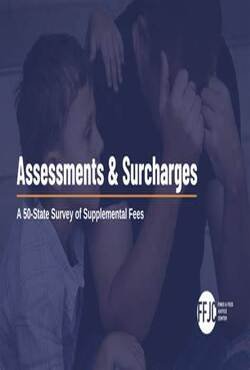By The Fines and Fees Justice Center
Fees are imposed on people accused of offenses in criminal, juvenile, municipal, and traffic courts around the country and are used to fund all types of court- or government-related programs, activities, or functions. For decades, justice fees have been a way that states raise revenue through a system of hidden taxes.1 Among these court-imposed costs, there is a particularly pernicious category of fees that are imposed on people simply because they are involved with the justice system. Whether they are called administrative assessments, surcharges, court costs, privilege taxes, docket fees, or something else, the one thing they have in common is that they are imposed in nearly every criminal, traffic, or local ordinance case—regardless of the offense, sentence, or specific circumstance of the particular case. Most are imposed only after conviction, but others, like docket fees, are imposed even if a person is acquitted or the charges are dismissed.2 For the purposes of this report, we collectively call these fees “assessments and surcharges,” recognizing that they may go by other names in different jurisdictions. Ultimately, these are “catch all” fees that legislatures impose to collect money exclusively from people drawn into a state’s various justice systems.3
New York: Fines and Fees Justice Center, 2022. 28p.


